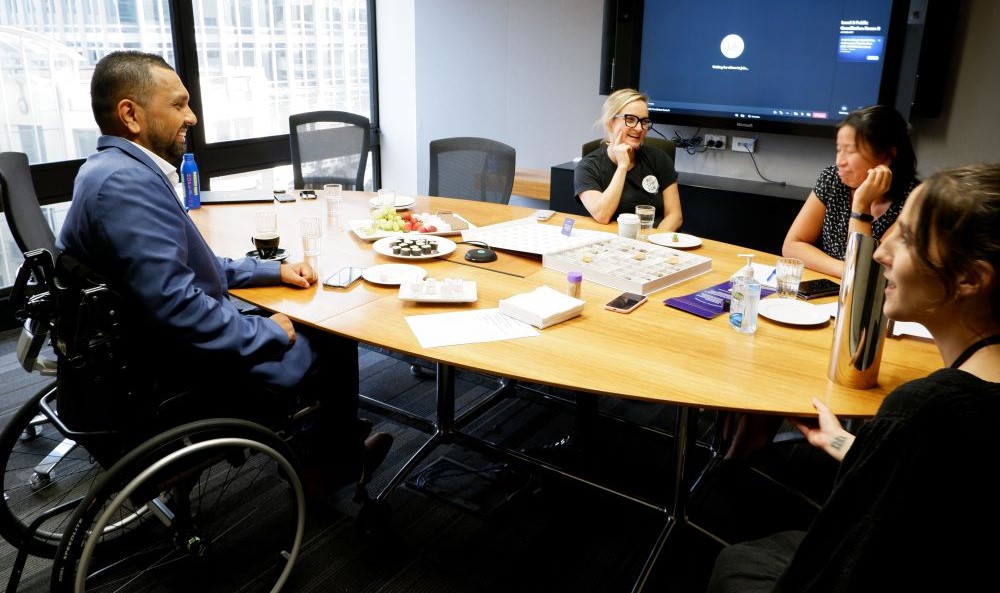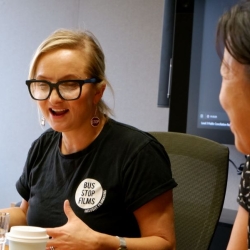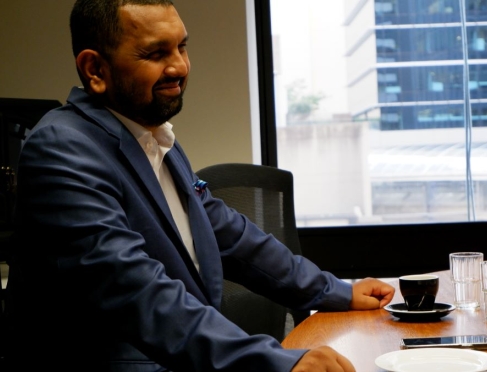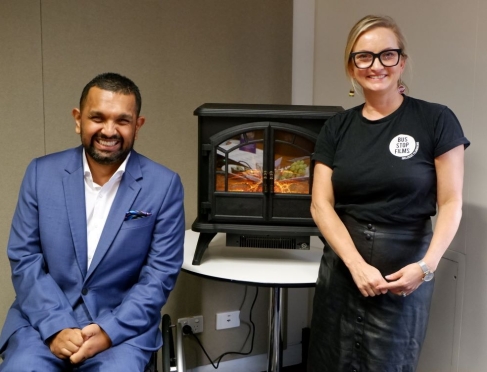Fireside Chat in April
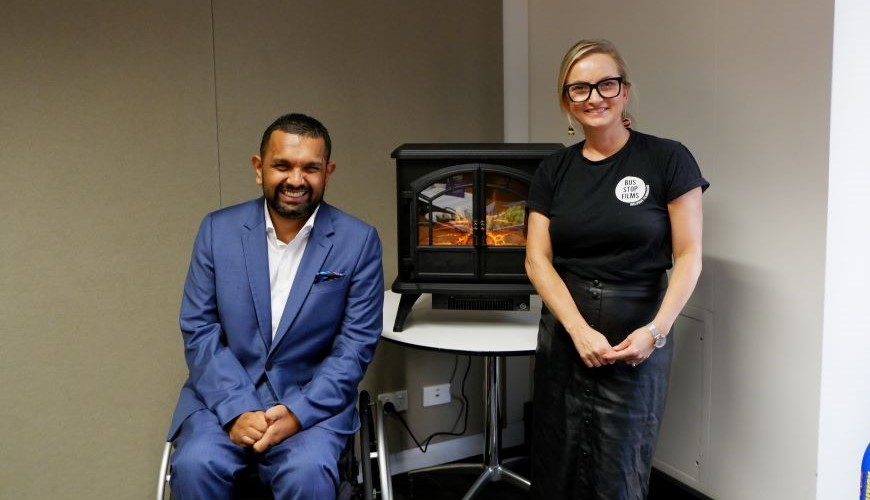
In April, we held our first Fireside Chat with IncludeAbility Ambassadors Tracey Corbin-Matchett and Dr Dinesh Palipana.
Our first Fireside Chat
IncludeAbility’s first Fireside Chat took place with IncludeAbility Ambassadors Tracey Corbin-Matchett and Dr Dinesh Palipana. Tracey is the CEO of Bus Stop Films, and Dinesh is a doctor in the Emergency Department of the Gold Coast University Hospital, a Senior Lecturer and Researcher at Griffith University and a Senior Advisor to the Disability Royal Commission.
Our Ambassadors discussed the barriers to employment for people with disability and how the notion of calling in can help, alongside other practical steps to remove these barriers and, ultimately, the benefits of employing someone with a disability on the business, the employee, and the community.
What has it meant to be an IncludeAbility Ambassador?
Dinesh discussed his personal connection to IncludeAbility and said,
"I think this is just something that's really close to my heart because of my own experiences that I've had and some of the difficult conversations that I've had to navigate.”
He said he hopes that the number of difficult conversations will decrease and said,
“I think the dream is for people not to have the challenges we faced and for the kids, in particular, to have a better future and access to work and employment."
Tracey said IncludeAbility had brought together a network of diverse Ambassadors that are doing exceptional things.
"Overall, it's just really awesome to see a diversity of lived experience that the different Ambassadors bring to the table".
Dinesh agreed and mentioned that it "has been a privilege and an honour to be part of this piece of work" because of IncludeAbility's impact on people.
Tracey and Dinesh saw immense value in participating in a project connected to the Australian Human Rights Commission. This connection emphasised that it is a human right to have access to equal employment and created a "certain credibility", emphasising that include Ability should be here to stay.
What are barriers to employment for people with a disability, and how to overcome them?
Tracey and Dinesh said the main barrier to employment for people with a disability was employers' attitudes. Tracey mentioned that it is not just about having a policy; there must be inclusive values across everyone in the company.
It’s not enough to have a “beautiful statement, disability inclusion action plan and morning tea in December… you also need to equip the people that are actually doing the managing or supporting or employing…If the person in charge of a team or hiring or working alongside a person with a disability has bias, there will be bias throughout the organisation”.
Tracey discussed the importance of starting with one person and the ability of one person to change the workplace culture, which has a flow-on effect and makes a big difference to the positive operation of the team in the workplace.
Dinesh said children should be educated from a young age on how to include, and work alongside, people with disability.
"In 18 years, [people] that are born today, they're going to be employees, they're going to become managers eventually… We need people [with disability] to be integrated into mainstream schools. We need them to be enabled so that people understand that this is what inclusion is, what a reasonable adjustment is, and it's not that difficult, and it makes us richer and have more fun."
Tracey said visibility of people with a disability was critical to the diversity of teams in the workplace. She said that it is important for people with disability to be a part of the workplace but also to be included in workplace social events like after-work drinks or lunch.
"It's a really critical piece in the puzzle of the workplace to include the person with disability in your team into all of those aspects". Visibility will allow people with a disability to get chances that they may not have had previously because. "Visibility is so critical in all jobs, not just for the lawyer, the doctor, the CEO. It’s critical at all levels to just see other people have a job, get a job, keep a job."
Calling in (rather than calling out)
There is a movement to replace the notion of calling out with the idea of calling in. Tracey mentioned that because often the most significant barrier to disability employment is attitudinal barriers, the bias you can't see can be caused by the reluctance to "get it wrong or cancel culture". Dinesh noted that this could be particularly seen around language because language is often evolving. Calling in gives the employer permission to fail or get it wrong and then have an open conversation to reach a middle ground. Tracey added it is about creating space for others and investing time, "holding the ladder down to bring people up with you."
Our Ambassadors noted that the fear of getting it wrong cannot be a reason to miss out on all the amazing talent of people with a disability.
Dinesh and Tracey emphasised the importance of creating cultural safety where people are given a chance to ask questions without the risk of offence or getting it wrong and therefore allowing them to learn. Dinesh noted that it is about being okay with these potentially uncomfortable conversations because they can instigate attitude changes.
Tracey mentioned that you can use IncludeAbility resources as a starting point for having these conversations. Dinesh said, "I think that kindness has to flow both ways where the disability community needs to be open to having those conversations as well."
What practical steps can employers take?
Tracey said employers should consider ‘job carving’ when looking to employ people with disability. Job carving is "looking at the roles that need to be performed and identifying the labour force need… and then working out the role and then doing it in a bespoke way, matching the person to the role" to allow employees with a disability to be valued and have their contributions appreciated.
Dinesh said employers should utilise what people are good at and passionate about bringing to the company. "We need to move away from this industrial factory worker thing where we just get a standardised person that needs to do X, Y and Z. Instead have people flourish… there are 1000 different ways to get to an outcome”.
Tracey encourages people to give employing people with disability a go: "Review, improve, review, refine, move on again and give it a go."
Other questions that employers can ask are:
- What are your access needs?
- What are your best performance times?
- What are your strengths?
- What are your weaknesses?
- What is your ideal work environment?
- How do you best perform in your role?
What are the benefits of hiring people with a disability?
There is a common misconception that employing people with a disability is challenging. Dinesh experienced this first-hand and recalled bosses who said "Actually, I thought this would be much harder. This has been a totally different experience to what I thought."
Tracey said employment improves health, wellbeing, and autonomy for people with disability. Earning a wage is a "really important milestone in our social maturity." Tracey emphasised that people with disability are natural innovators who "have had to think outside the square… it might be the person with a disability that could solve a problem for your company and improve your bottom line.” This will overall result in greater benefits for any business. People with disability make up 20% of the population, and thus Tracey noted that it makes "great business sense to market to us".
What are some notable improvements in your employment areas?
Dinesh said that in medicine, there have been significant recent changes, such as an enterprise bargaining agreement in Queensland that "for the first time in Australian history protects the rights of doctors who acquire a disability or come into the profession with the disability. Melbourne University has three medical students who have disabilities now, and two of them have a spinal cord injury, so things are starting to change in medicine." Dinesh credits this to a significant change in attitude but said there is still a long way to go.
Similarly, Tracey has been seeing changes in the film industry, particularly with the change in the Oscars guidelines. "Bus Stop films are ahead of the curve. We were doing it before it was cool … we have this framework in which our industry operates globally. If you're not on the right side of history, you're not future proofing your career and for the sector."


